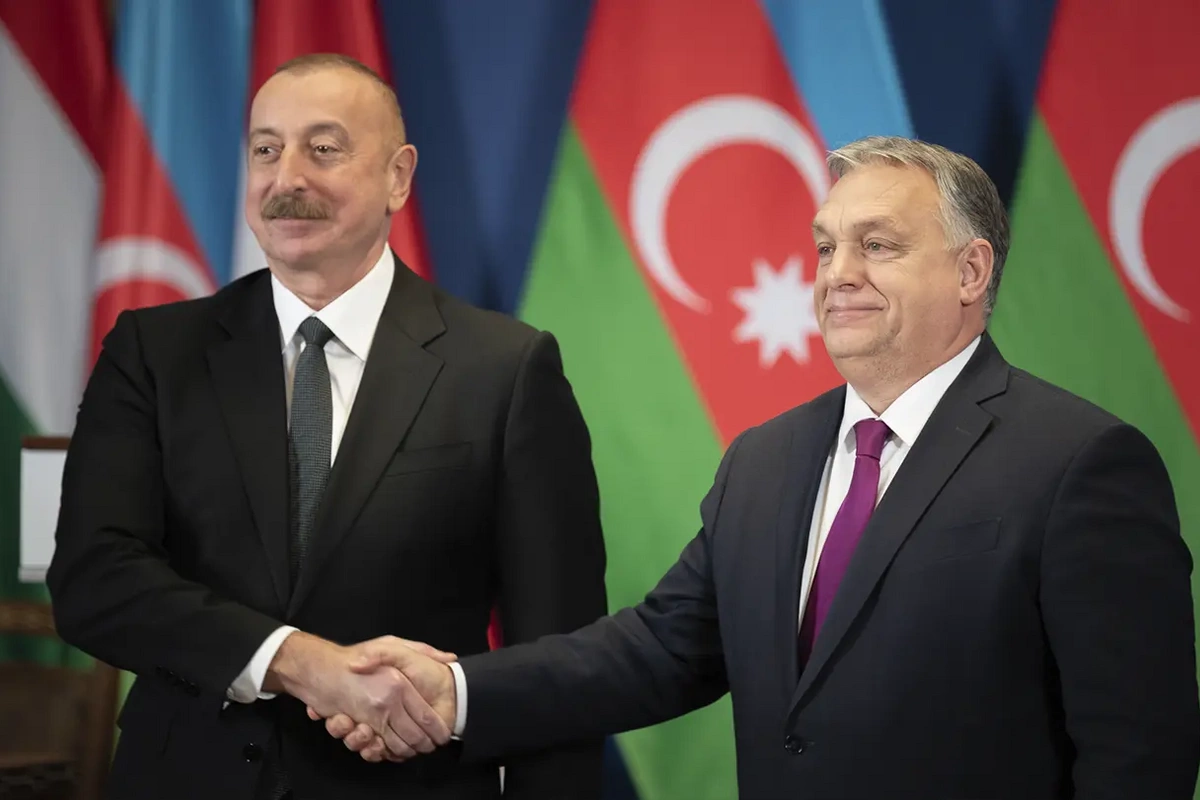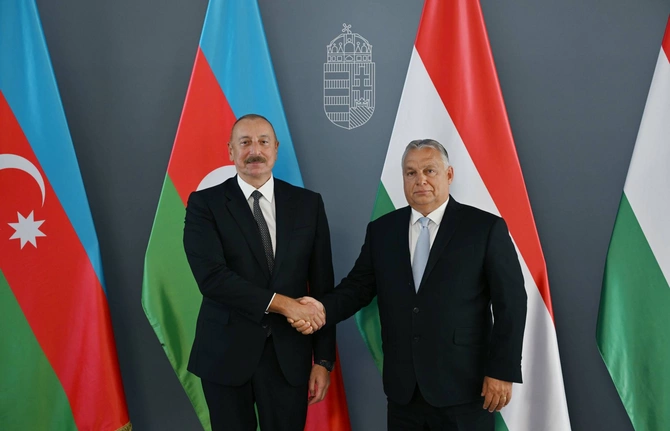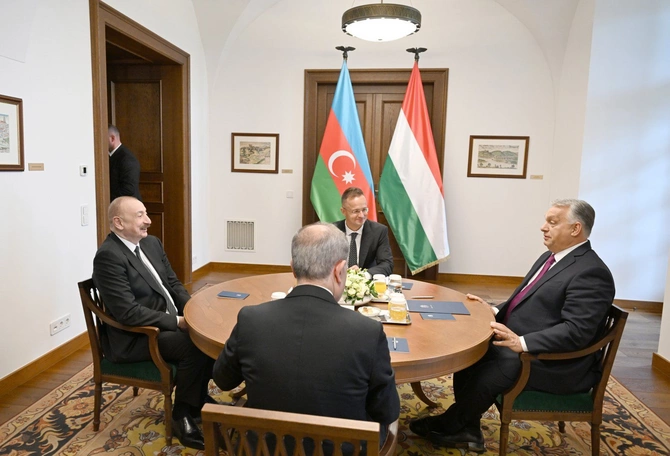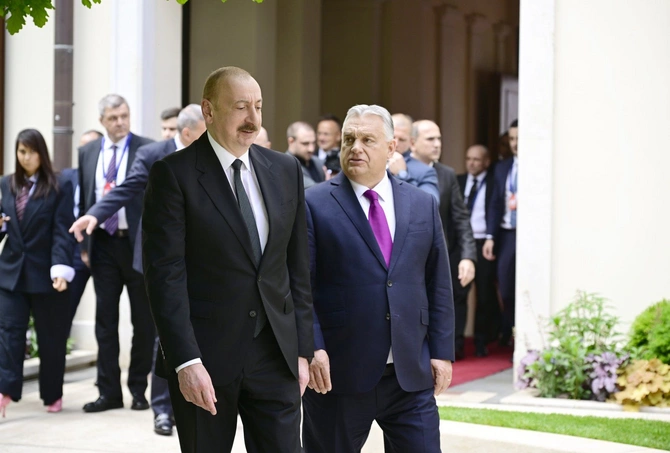
Photo credit: miniszterelnok.hu
By Asif Aydinly
On May 20, 2025, a pivotal round of the Azerbaijan-Hungary strategic dialogue took place in Budapest. President of the Republic of Azerbaijan Ilham Aliyev and Prime Minister of Hungary Viktor Orbán held high-level talks, followed by press statements that highlighted not only the strength of bilateral relations but also a shared political philosophy in the face of global uncertainty.

Photo: Azertac
A Friendship Proven by Time and Challenges
At the outset of his remarks, Prime Minister Viktor Orbán emphasized that President Ilham Aliyev has been a steadfast friend of Hungary for more than two decades. His support, Orbán noted, has extended to critical areas such as diplomacy, energy, and economic development. “A friend in need is a friend indeed,” he said, underlining the depth of trust that defines Baku-Budapest relations.
The Hungarian Prime Minister stressed that in today’s unstable world, reliable partnerships have become invaluable. Amid the war in neighboring Ukraine, sanctions, and a widespread energy crisis, Hungary-being landlocked-has found itself especially vulnerable. Yet, cooperation with Azerbaijan and other Turkic states has enabled the country to maintain its energy security. Azerbaijan supplies natural gas on competitive terms, and Hungarian companies are now stakeholders in major oil and gas projects in the Caspian region.

Photo: Press service of the President of the Republic of Azerbaijan
Energy Cooperation: The Cornerstone of Strategic Ties
Azerbaijan has confirmed that gas deliveries to Hungary will continue in full. Moreover, President Aliyev stated that Baku is ready to meet Hungary’s gas demand entirely. Hungarian energy firm MVM already holds stakes in Azerbaijan’s key offshore fields-Azeri-Chirag-Gunashli and Shah Deniz-and a new contract is expected to be signed soon, allowing Hungarian companies to expand operations onshore.
President Aliyev also emphasized Azerbaijan’s long-term energy strategy, which includes expanding both conventional and renewable energy production. Within the next five years, the country plans to generate 6,000 megawatts of green energy. These are not aspirational goals but signed, actionable contracts. This renewable output will allow Azerbaijan to save up to 3-4 billion cubic meters of natural gas, which can then be directed toward European markets-especially partners like Hungary.
Currently, Azerbaijan exports natural gas to 12 countries, 10 of which are in Europe and 8 are EU member states. The European Commission has officially recognized Azerbaijan as a reliable pan-European gas supplier. Azerbaijan’s vast and growing export geography underscores its role as a global leader in pipeline-based energy transport.
Shared Values: Sovereignty, Identity, and Independent Policy
Beyond energy and trade, both leaders reaffirmed the shared political values that unite their countries. President Aliyev expressed deep respect for Viktor Orbán’s firm and independent leadership within the European Union.
During his visit, President Aliyev praised Prime Minister Orbán, calling Hungary’s unwavering defense of national interests within the EU a true act of political heroism. He described Hungary as a rare example of a state within the European bloc that firmly upholds its sovereignty and effectively neutralizes external attempts to destabilize its society.
Aliyev commended Orbán’s principled stance, his refusal to retreat under pressure, and his ability to implement an autonomous political course despite systemic challenges within the EU. Thanks to Orbán’s leadership, Hungary has preserved its national and family values and resisted harmful ideological influences from abroad. Azerbaijan, a country that also pursues an independent foreign policy, finds this approach both admirable and inspiring.
Karabakh and Regional Peace
The press conference also addressed peace efforts between Azerbaijan and Armenia. President Aliyev reiterated that Azerbaijan initiated the post-war peace process following the Second Karabakh War and was the author of the initial draft of the peace agreement. He confirmed that the Armenian side has largely accepted this proposal, albeit with some amendments.
However, for a comprehensive peace to be achieved, two conditions remain essential: Armenia must remove territorial claims against Azerbaijan from its Constitution, and the long-defunct OSCE Minsk Group must be formally dissolved. While Armenia has so far resisted these demands, Aliyev expressed confidence that geopolitical reality will eventually compel Yerevan to accept them.
Prime Minister Orbán congratulated Azerbaijan on the progress made toward a final peace agreement and stressed that conflict resolution should occur not on the battlefield but at the negotiation table-applying not only to the South Caucasus but to all global hotspots.

The Turkic Dimension: Bridging East and West
One of the most symbolic developments in Azerbaijani-Hungarian relations is the growing role of the Turkic world. Hungary, an observer in the Organization of Turkic States, hosted the informal OTS summit for the first time on its soil. President Aliyev praised Hungary’s commitment to its historical and cultural roots and highlighted the importance of this gesture for broader regional cooperation.
The first informal OTS summit was held in 2023 in Shusha, Azerbaijan. Now, with Hungary taking over the initiative, the bond between the Turkic world and Central Europe is being visibly strengthened. This illustrates Hungary’s active positioning as a bridge between East and West-a vision also shared by Azerbaijan.
A Model of Pragmatic and Value-Based Cooperation
In his concluding remarks, President Aliyev praised Hungary’s capacity to maintain an independent foreign policy within the highly regulated EU framework. He noted that while EU member states are often constrained by collective rules and foreign policy consensus, Hungary-under Viktor Orbán’s leadership-has consistently placed national interests above all.
“He has always supported initiatives that benefit Hungary and distanced himself from those that do not,” said Aliyev. “We deeply admire Hungary for this approach.” He also extended his best wishes to the Hungarian people, expressing confidence that the two nations would continue to expand and deepen their partnership in the years to come.
Azerbaijan and Hungary are setting an example of how two sovereign nations-each proud of its heritage and confident in its direction-can build a strategic alliance based on respect, shared values, and mutual benefit. At a time when global institutions are under strain and traditional alliances are shifting, the Azerbaijan-Hungary partnership offers a compelling model of diplomatic balance, economic foresight, and moral clarity.
Share on social media